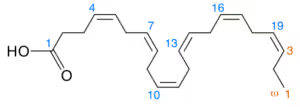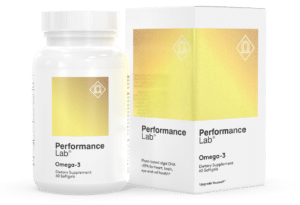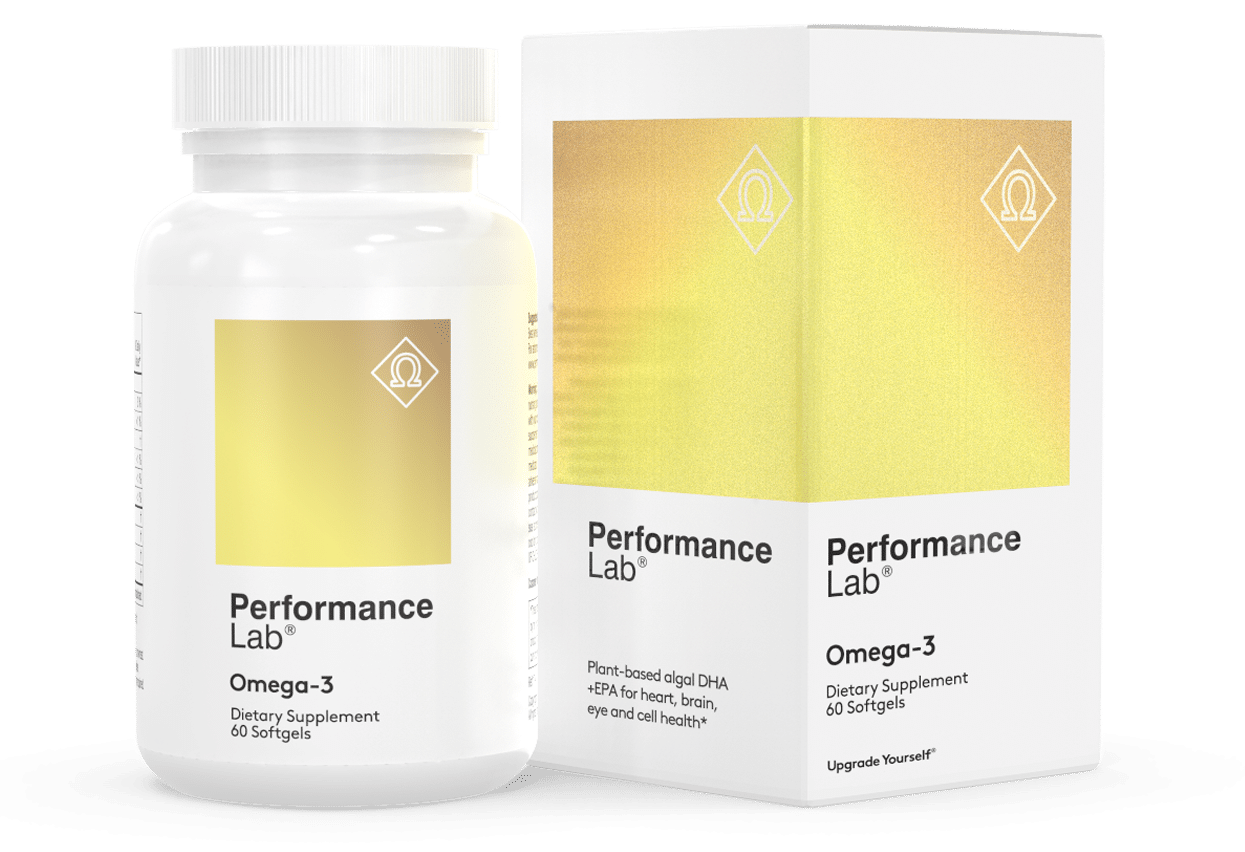Table of Contents
DHA (docosahexaenoic acid) is an omega-3 fatty acid. DHA is crucial for the healthy structure and function of your brain at all ages.
DHA impacts your brain’s signaling systems, neurotransmitters, memory, learning, focus and attention. It helps reduce and even repair cognitive decline.
The best algae-sourced DHA on the market today is Performance Lab® Omega-3 which contains 600 mg of DHA and 300 mg of EPA per dose.
The famous Framingham Heart Study followed-up with 899 men and women who were free of dementia. Subjects had a median age of 76 years. And were followed for 9.1 years for the development of dementia and Alzheimer’s Disease.
Results from the study showed 99 new cases of dementia including 71 of Alzheimer’s. The researchers concluded that those with the highest levels of DHA were “associated with a significant 47% reduction in the risk of developing all-cause dementia”.[i]
DHA helps:
- BDNF. Brain-derived neurotrophic factor (BDNF) is your brain’s growth hormone. DHA has the ability to turn on your brain’s BDNF.
- Neuroplasticity. DHA helps your brain build new neural pathways. Critical for maintaining a healthy brain. And optimizing neural signaling and cognition.
- Neuroprotection. DHA acts as an anti-inflammatory by reducing the enzyme COX-2. Inflammation is a key factor in both Alzheimer’s and Parkinson’s Disease. And in every other neurodegenerative disease.
Overview
DHA (docosahexaenoic acid) is an omega-3 fatty acid. Your brain is made up of 60% fat. And much of that fat is DHA.

Your body does not make DHA on its own. So you must get it from food or a supplement. And if you are a vegan, you are at serious risk of a life-threatening DHA deficiency.
Foods that are rich in DHA include fish, fish oil, Krill and other crustaceans, and algae.
But fish do not make DHA. Fish and other marine predators get it from smaller fish and crustaceans that feed on algae. It’s algae that has the enzymes to produce DHA that we need to remain healthy.
The best algae-sourced DHA on the market today is Performance Lab® Omega-3 which contains 600 mg of DHA and 300 mg of EPA per dose.
DHA from eggs and some dairy products only supply about 20 mg of DHA per day.
DHA is essential for maintaining brain health, memory and learning functions. DHA reduces brain inflammation, stimulates new nerve cell growth, and assists in brain cell repair.
How does DHA Work in the Brain?
Your brain is composed of 60% fat. 15 – 20% of your cerebral cortex is DHA. Even the retina in your eyes is 30 – 60% DHA. Making DHA the most essential nutrient for eye and brain health.
The highest levels of DHA are found in phosphatidylserine (PS) and phosphatidylethanolamine (PE).[ii] Lower levels are found in phosphatidylcholine (PC).
PS makes up about 70% of neuron tissue mass. It helps in the storage, release and activity of neurotransmitters and receptors.
PC also makes up part of the neuron tissue mass. And helps in maintaining cell structure, fat metabolism, neuron signaling and the activation of a number of enzymes.
And PE is part of neuron cell membranes. PE is involved in cellular signaling.
PS, PE and PC are called phospholipids. Together they alter the fluidity of cell membranes. Changing the fluidity of cell membranes alters their permeability and protein activity. And influences cellular signaling.
Made up largely of DHA, these cellular membranes regulate entry into the cell, and control neuroreceptor function. Which facilitates cellular communication between, and within cells.
DHA also reduces inflammation by regulating proteins and enzymes within cells. And boosts the production of anti-inflammatory compounds that protect cells.
DHA maintains the activity of certain enzymes that control electrical signaling between cells. And it regulates the brain cell concentration of PS which is vital for cell survival.
And DHA regulates calcium oscillations, which are involved in neurotransmitter release, mitochondrial function, gene activation, oxidative stress and brain cell development and growth (BDNF).
DHA vs. EPA: What’s the Difference?
Most medical authorities and scientists agree that Omega-3 oils are important for good health. Omega-3s boost brain function, decrease inflammation, reduce the incidence of fatal heart attacks and strokes, help autoimmune diseases and improve vision.
 We have general agreement about the health benefits of Omega-3 oils. But few appreciate the difference between DHA (docosahexaeonic acid) and EPA (eico-sapentaenoic acid).
We have general agreement about the health benefits of Omega-3 oils. But few appreciate the difference between DHA (docosahexaeonic acid) and EPA (eico-sapentaenoic acid).
The ratio of DHA and EPA varies a lot in commercial Omega-3 supplements. Most have higher concentrations of EPA to DHA. Mainly because it’s cheaper to manufacture, and has less of a fishy odor.
But studies show that most of the brain health benefits of Omega-3’s are derived from DHA rather than EPA.
One study in Chicago followed 815 residents from 1993 – 2000. Study subjects were between 65 and 94 years. 131 study participants developed Alzheimer’s Disease. Those who ate fish at least once a week had a 60% less risk of Alzheimer’s compared to those who didn’t eat fish.
Researchers found that it was the intake of DHA rather than EPA that reduced the risk factor in getting Alzheimer’s. EPA made no difference whatsoever.[iii]
How Things Go Bad
From reviewing the “How does DHA Work in the Brain” section of this article, you can imagine that when things go bad with DHA – they go really bad.
Fish and marine oil supplements like krill oil are a source of DHA and EPA because they get it from algae. Plants contain another Omega-3 called alpha-linolenic acid (ALA).
Technically ALA can be converted to DHA and EPA. But most modern humans lack the ability to convert plant sources of Omega-3s into all the DHA our brain needs.
When we don’t get enough DHA, we experience:
↓ Problems with attention, learning and memory
↑ Depression, anxiety, aggression, anger, suicide risk
↑ Bipolar disorder, Alzheimer’s Disease and Schizophrenia
Not having adequate levels of DHA in the brain cause things to break down. If the inadequate intake of DHA goes on for a while, disease starts to set in. Including neurodegenerative diseases like Alzheimer’s and cancer.
DHA benefits
DHA makes up much of the gray matter in your brain. It’s an integral part of cell membranes and their function.
Your brain is 60% fat. And a large part of that is DHA.
The good news is; degenerative conditions can not only be prevented by adding DHA to your nootropic stack. It can also be reversed.
In one study, researchers worked with 485 elderly subjects with memory problems. They saw significant improvement with those taking 900 mg of DHA per day for 24 weeks compared to the control group.[iv]
In another double-blind, placebo-controlled trial, scientists worked with 49 women aged 60 – 80 years. One group received 800 mg per day of DHA for 4 months.
Researchers found those using DHA had a significant improvement in verbal fluency scores. And an improvement in memory and learning.[v]
How does DHA feel?
Chances are when you start using DHA you won’t feel it. There’s no profound stimulant feeling.
But if you suffer from chronic depression, within a few weeks you should feel the depression lift.
After supplementing with DHA for a while your cognition will be better. You’ll think clearer and quicker. Your memory and ability to learn will improve. And you’ll likely have more energy and motivation.
But it is very likely you won’t think to attribute these improvements to adding DHA to your stack. Something else will get the credit.
DHA Clinical Research
DHA is crucial for an optimally functioning brain. The goal of every neurohacker. DHA impacts your brain’s structure, signaling systems, neurotransmitters, memory, learning, focus and attention.
We have decades of clinical research verifying the importance of DHA in your nootropic stack. And several books have been written on the subject in the last couple of years. Here’s just a snippet of what’s available…
DHA Reduces Hostility and Anger
In a study with 41 university students in Japan, scientists compared a high-DHA diet (1.5 grams/day) with placebo. This was recorded over 3 months to see the effects on hostile responses.
The researchers found a 27% incidence of hostile answers in the placebo group when nothing extraordinary was going on. And hostile responses rose to 92% during final exams.
There was no increase in hostility among those taking a DHA supplement. These guys even found DHA supplementation significantly reduced hostility among university staff.[vi]
DHA Restores Neurotransmitters & Memory
As your brain ages, there is an increase in membrane rigidity. This causes changes in synapses resulting in a decrease in transmitter release. Long-term potentiation is affected which impairs the development of memories.
Several studies have shown that DHA can support healthy levels of these neurotransmitters. In one study with aged rats, researchers restored neurotransmitter release in the hippocampus. And reversed age-related memory problems.
Adding omega-3 fatty acids to the rat’s feed for 8 weeks raised concentrations of DHA in the rat’s brain. And actually reversed age-related memory impairment.[vii]
DHA Improves Attention & Learning
DHA also has an effect on neurotransmitters serotonin, norepinephrine, acetylcholine, glutamate and dopamine. Deficiencies in DHA have been shown to lower levels of dopamine. Resulting in problems with attention and learning.[viii]
DHA even plays a role in neurotransmitter receptor function. DHA affects brain cell membrane structures including neuroreceptors.[ix]
Some of these receptors communicate inside cells when stimulated by glutamate, serotonin and acetylcholine.[x] The numbers of these receptors can be increased by you, by adding DHA to your nootropic stack.
So if you are using nootropics that affect things like acetylcholine, serotonin, dopamine and serotonin in your brain. It would be wise to add DHA to your nootropic stack. And ensure you get the most bang for your investment in nootropics.
DHA Recommended Dosage
Recommended daily dosage of DHA is 1,000 mg.
Fish oil supplements vary in ratios of DHA to EPA. Salmon naturally contain more DHA than EPA. A supplement from algae may contain only DHA.
Krill oil provides both DHA and EPA. So read the labels. And whatever supplement you get, make sure you end up with at least 1,000 mg of DHA.
And recall that fish and krill do not produce DHA on their own. Marine life get their DHA from algae in the wild.
Most brands of fish oil have been proven safe, and free of mercury. And do not contain unsafe levels of PCB’s (polychlorinated biphenyls).
To further avoid the contaminants in an unrefined supplement, choose a fish oil or Omega-3 supplement made from small, oily fish like anchovies, sardines or menhaden. And check the labels carefully for purity.
Ideally, get one of a few supplements now available that are pure, refined DHA. With lower or minimal amounts of EPA.
DHA Side Effects
Fish oil capsules commonly have both DHA and EPA. Capsules with EPA are not recommended for infants or small children. Because they upset the balance between DHA and EPA during early development. This also applies to pregnant women.
Fish oil could cause minor side effects like loose stools, upset stomach and belching.
Fish oil may lower blood pressure. So if you already take a medication to lower blood pressure, make sure you talk to your doctor first.
If you’re supplement contains EPA, it could interact with blood thinners and increase bleeding. Same is true for aspirin. But this is not true of DHA. DHA-only supplements do not thin the blood.
Fish oil supplements may lower blood sugar levels. So be careful if you’re on diabetes medications.
Omega-3 fatty acids may reduce some of the side effects of cyclosporine which is used to stop rejection after an organ transplant.
Type of DHA to Buy
 DHA is available as a supplement in two forms:
DHA is available as a supplement in two forms:
- Fish oil or Omega-3 capsules. Which usually have both DHA and EPA. Most Omega-3 supplements contain higher amounts of EPA compared to DHA. But for our purposes, and to support cognitive health, we need an Omega-3 supplement containing higher amounts of DHA to EPA.
- DHA from fish oil. Some supplement manufacturers now offer capsules containing higher amounts of pure, refined DHA. And reduced amounts of EPA. Our brains require 1,000 mg DHA per day. So look for a DHA supplement that provides 1,000 mg DHA in 2-3 gelcaps.
- DHA from algae. Which may or may not contain EPA and is vegetarian friendly. Algae is the natural source of these Omega-3s in the wild and where fish and other marine life get their Omega-3s.
For as little as $49/month you can experience better cognition, memory and mood simply by using a daily DHA supplement. My favorite is Performance Lab® Omega-3 which contains 600 mg of DHA and 300 mg of EPA per dose.
Performance Lab® Omega-3 contains life’s™ OMEGA algae oil which supplies natural triglyceride Omega-3s that are 70% more bioavailable than synthetic ethyl esters used in cheaper and lower quality Omega-3 fish oil supplements.
Performance Lab® Omega-3 is delivered in NutriGels which are vegan, carrageenan-free softgels. No fishy smell or aftertaste and easy on your digestive system.
Try a bottle today: Performance Lab® Omega-3
Nootropics Expert Recommendation
DHA (Omega-3) 1,000 mg per day.
 I recommend using DHA as a nootropic supplement.
I recommend using DHA as a nootropic supplement.
Your body does not make DHA on its own. So you must get it from food. Or take it as a supplement.
DHA is one of the most important nootropics you can add to your stack. Your brain is 60% fat. And much of that fat is DHA.
DHA is critical for brain cell repair and regeneration (neurogenesis). And it is an integral part of neural signaling. Both between neurons as well as inside brain cells.
DHA has an effect on critical neurotransmitters and neuroreceptors. It is a powerful anti-inflammatory. And is involved in neuroplasticity.
Hundreds of studies on Omega-3s and DHA show benefits in preventing and even reversing neurodegenerative disease.
It’s best if you find a supplement that contains twice as much DHA than EPA. Such as Performance Lab® Omega-3. And you can safely take 1,000 mg of DHA per day.









Join The Discussion - 208 comments
Andrew Richardson
December 27, 2020
Does all Omega 3 (fill oil) have Vit D in it? Just wondering cause if not then I can take Vit D separately or at the same time as my omega 3? I only take 1000ui of Vit D per day or when I feel I need it, Should omega 3 be taken everyday
David Tomen
December 27, 2020
Andrew, Omega-3s should be taken every day but you need to make sure your dosage is high enough. You need at least 1,000 mg DHA per day and half that of EPA. And no it does not provide any Vitamin D.
Vitamin D3 should be dosed at 4,000 – 5,000 IU per day as well. Both taken in the morning.
Andrew Richardson
December 27, 2020
okay I’m looking to heal my brain from chronic stress
I’m just want to make sure what I’m taking does not conflict with other stuff
so
bacopa 500mg 20mg bacosides
Rhodiola 100mg
Two Green tea per day which has l-theanine
Vit D
omega 3
magnesium 150MG per day
is this an alright amount
Thank you
David Tomen
December 28, 2020
Andrew, the stack you are using does not conflict with anything. But the dosages for Bacopa Monnieri extract, Rhodiola Rosea extract, L-Theanine and Magnesium are too low. Please see my review for each of these supplements for the correct dosage and time of day to take them.
Andrew
December 29, 2020
Okay cool, I just wanted to make sure that all those combined could not cause serotonin syndrome (I Don’t take any pharmaceutical drug)
Thanks.
Yasser
November 22, 2020
Dear David
First of all: thank you for all your work! Thank you also for sharing a lot of it so generously! I’ve been watching you on Youtube and yesterday I downloaded the free book on Nootropics.
I had a question pertaining to omega 3 uptake by the body.
I am a (Belgian) student and obviously try to manage as much as I can as cheap as possible. Even cheap DHA supplementing (adequately) adds up to quite a large amount of money. However: it is not at all expensive or difficult to get in heaps of ALA! The problem, I understand, is that the conversion of ALA into DHA can be problematic due to a limited supply of a particular enzyme responsible for this, even further complicated by the fact that that same enzyme is also the agent tasked with processing omega 6, which it prioritizes. So, my question is: can’t we just supplement/increase that enzyme?
I am already very thankful for your work; that said, I’d be very interested in some thoughts and/or advice in regards to this. Maybe it’d help out other poor buggers too!
Kind regards and thank you for your time!
David Tomen
November 23, 2020
Yasser, I wish is was that easy. The problem is the conversion of ALA to DHA is only a few percentage points. Almost nothing compared to what your brain needs to excel as a student.
I explored this a little more in this article which you may find helpful: https://nootropicsexpert.com/how-long-does-it-take-for-omega-3-to-work/
yasser
November 23, 2020
…Bummer! Thank you for your speedy answer! Good night! (it’s past 10 pm over here)
John
July 12, 2020
Hi David:
Thanks for all the great info on DHA.
QUESTION-1:
I was looking at KRILL OIL product from Dr Mercola.
Each serving per day = 2 capsules per day = DHA 55 mg (per two capsules) per day.
Therefore, based on your 1000 mg DHA per day recommendation, I would need to take approx 36 of these capsules !!!
Does this sound extreme to you ?
Have I missed something here ?
QUESTION-2:
The marketing on this Dr Mercoal Krill productstates that studies suggest that krill oil, when compared to fish oil, is as much as 48 times more effective, meaning you need less of it.
Therefore, this would mean that the daily dose of the KRILL oil at DHA 55mg / day should be adequate ?!?!?!?
What is your view on this ???
QUESTION-3:
Do you know if Performance Labs plans on releasing their version of a fish oil product ?
Thanks,
John
David Tomen
July 12, 2020
John, if you’re looking for a DHA supplement it’s best to stick with a true, high quality, tested DHA product. Dr. Mercola’s doesn’t cut it by any stretch. His product contains 1/10th of the DHA your brain is begging for.
There’s plenty of debate around the best form of fish oil to use. Ignore the hype because we’re not talking about fish oil here for cognitive health. We’re talking about the benefits of DHA vs EPA. And while both are needed, for brain health, DHA wins hands down.
And DHA is an extract of fish oil. Sure, it’s best to use something from a sustainable source and Krill is a sustainable source. But we still need 1,000 mg DHA from Krill, Calamari or Algae every single day.
I’ve included my favorite 3 DHA supplements under the “Available Forms” section of this review. That will be updated just as soon as Performance Lab launches their supplement. I’ve not been able to get a launch date out of them so continue to use 2 gelcaps of Nature’s Way every morning. It has 1,000 mg DHA and 400 mg EPA in 2 gelcaps and it works.
MR MIKE
June 15, 2020
Hello David
– I am planning to take a supplement stack for the purpose of increasing (HGH) human growth hormone to help me with skin issues and weak bones.
– Can you please tell me if there is any potential negative interactions between the supplements that I plan to take:
– Morning: (Fish oil 1g)-(Calcium 1g)-(Vitamin k2 mk4 5mg with mk7 and k1)-(Vitamin C 500mg)-(SAM-e 400mg)-(Ipriflavone 300mg)
– Noon: (SAM-e 400mg)-(Vitamin C 750mg)-(Alpha GPC 600mg)-(Mucuna pruriens 100%extract L-Dopa 500mg)
– Early evening: (Niacin “flush-version” 500mg)-(Ipriflavone 300mg)-(Vitamin C 750mg)
– Before Bed: (Zinc 15mg)-(Magnesium 200mg)-(Melatonin 3mg)-(ALCAR 500mg)-(Pro-GH supplement containing: 1.5 g Arginine – 1.5g Orthenine – 500 Lysine – 2g Glutamine – 2g Glycine – 500mg GABA)
David Tomen
June 15, 2020
Mike, only thing I suggest changing is your fish oil to a DHA supplement instead. I explain why in the above review.
Johnez
May 31, 2020
Hey David, Steven was replying to the claim that DHA converts to EPA that stated in 2016 (the post he replied to). I’ve read that EPA converts to DHA and plays a big role in preventing inflammation. In fact most of the articles I read point to EPA being the more important and useful over DHA. It would be great if you can revisit this topic. I’m slightly annoyed that there is so much conflicting info and really don’t know what to believe.
David Tomen
June 1, 2020
Scroll back up and read this section: https://nootropicsexpert.com/dha/#dha-vs-epa-what%e2%80%99s-the-difference.
DHA does NOT convert to EPA. And EPA does NOT convert to DHA.
This is one of the reasons I started Nootropics Expert. Because there is so much garbage out there. Even by so-called experts. One person blogs a lie and a couple dozen others copy it.
60% of your brain is fat. And most of the fat is DHA. If you don’t get enough DHA your brain won’t work very well. EPA does have a limited role in our health. And there is some evidence that in some cases it may help depression. But for a healthy, optimized brain you need 1,000 mg of DHA every single day of your life.
John
July 12, 2020
Hi David:
I think the confusion may come from your comments from here:
”
David Tomen says
July 29, 2016 at 2:40 pm
……………………
……………………
Our bodies use EPA to improve blood flow and improve overall brain function.
But our bodies convert DHA to EPA naturally
(http://www.ncbi.nlm.nih.gov/pubmed/9076673). So to me, it makes more sense to supplement with pure DHA.
“
David Tomen
July 12, 2020
John, I was looking for that study but missed it! Thank you. It was lost in time …
John
July 13, 2020
Hi David:
Thanks for responding so quickly.
Just to clarify …
Does that mean that the previous comment from 2016-JUL-29 is no longer the current view ? i.e. “But our bodies convert DHA to EPA naturally” is no longer a valid statement ?
John
David Tomen
July 13, 2020
John, the thing is it’s just one study. So I doubt that it matters much if our bodies can in fact convert EPA to DHA.
Either way we’re not getting enough DHA every day to keep our brains (which are 60% fat) in good shape. Most of that fat in our skull is DHA. The easiest and least expensive way to keep DHA levels optimal is with a DHA supplement. I’m paying $10 a month for Nature’s Way DHA and it works.
Mike
May 15, 2020
Hi David, I take 3g of DHA and 1,5g of EPAl, is it too much?
Thanks for this fascinating website!
David Tomen
May 15, 2020
Mike, I’ve seen studies that used up to 1 1/2 grams per day of DHA that worked well. But not 3 grams. I just don’t see the benefit of using that high a dose. Not necessary because your body and brain just can’t use that much.
Lexus
April 19, 2020
Hey David does DHA help repair a brain from neurotoxicity from MDMA and if so what is the best dose for that … And if it’s not dha can you please tell me what will fix this damage thank you!
David Tomen
April 20, 2020
Lexus, best thing is Acetyl-L-Carnitine which protects from the oxidative damage of Ecstasy (MDMA): https://nootropicsexpert.com/acetyl-l-carnitine/. Check the study I’ve go under “The Research” section.
Pavlos
April 2, 2020
Hi David,
When I take fish oil which contains 180mg EPA and 120mg DHA, I get brain fog, is this cause the contain of mercury?
David Tomen
April 23, 2020
Pavlos, if the cause of your brain fog is this fish oil supplement then I strongly suggest to dump it. And choose a high quality DHA supplement instead.
If the brain fog is caused by something else, please read this: https://nootropicsexpert.com/best-supplements-for-brain-fog/